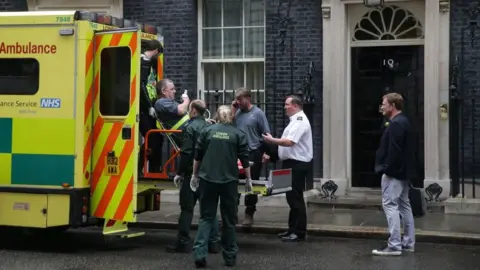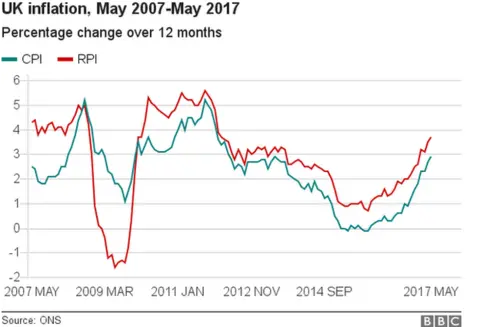Public sector pay: TUC says wages down thousands since 2010
 Getty Images
Getty ImagesFirefighters, teachers and other public sector workers are thousands of pounds a year worse off than they were in 2010, the TUC has said.
With inflation outpacing the government's 1% limit on pay rises for state employees, real wages are being eroded, said the trades union body.
It said prison officers and paramedics were more than £3,800 a year poorer.
However, the chancellor has said state sector workers get a 10% "premium" over private sector counterparts.
The government has come under pressure since the election in June to alter its policy of limiting pay rises in the public sector.
'Very generous'
"It's been seven long years of pay cuts for our public servants. And ministers still won't tell us if relief is on the way," TUC general secretary Frances O'Grady said.
Inflation measured by the most commonly used method, CPI, which does not take housing costs into account, has picked up in recent months hitting 2.9% in May. According to the Bank of England it averaged 2.7% a year between 2010 and 2016.
The TUC calculates that if firefighters' wages had kept pace with inflation their average pay would be nearly £2,900 higher than it is. For nuclear engineers and teachers the figure is about £2,500.
On the BBC's Andrew Marr Show on Sunday, Chancellor Philip Hammond said public sector pay had "raced ahead" of the private sector after the economic crash in 2008.
He added that when "very generous" public sector pension contributions were taken into account, public sector workers enjoyed a 10% "premium" over their private sector counterparts,
But Mr Hammond refused to comment on reports he had said at a meeting that public servants were "overpaid".

TUC wage estimates
 Getty Images
Getty ImagesThe average pay for an NHS paramedic is £35,577.
But if the paramedic's salary in 2010 had kept pace with inflation measured by CPI, by now he or she should be earning £39,435 - £3,888 more, says the TUC.
The TUC says if RPI (the inflation measure which does include housing costs) is used, the paramedic would need to earn £41,717 - £6,140 more - to maintain their 2010 spending power.
The TUC's analysis suggests workers in different parts of the public sector are out of pocket in real terms to varying degrees (based on CPI):
- Crown prosecutor £4,400
- NHS specialist dietician £3,858
- Prison officer £3,819
- Firefighter £2,888
- Nuclear maintenance engineer £2,591
- Teacher £2,414
- Lifeguards' £2,200
- NHS ancillary staff £897

Pay rises for most public sector workers are set by independent pay review bodies, but have effectively been capped at 1% each year since 2013.
Before that, there was a two-year freeze on pay for all but the lowest-paid workers.
Trade unions plan to submit a petition to the Treasury on Monday calling for the pay cap to be lifted.

Find out if your wages are keeping up with inflation
Enter your details below. Source, Office for National Statistics.
